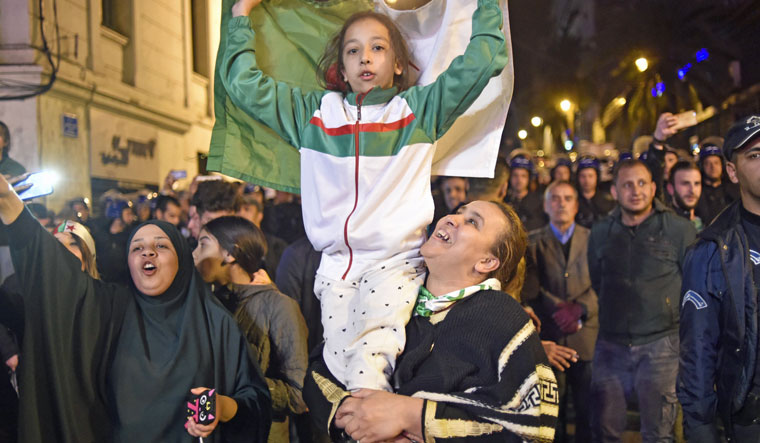Celebrations erupted on streets of Algeirs when President of Algeria Abdelaziz Bouteflika submitted his resignation. After holding office for two decades, he stepped down from presidency on Wednesday rattling international partners.
Bouteflika, who stepped down post weeks of protests and loss of army support, apologised to people of the country. It will now be interesting to see what is next for the energy-rich nation that is a key player in fighting terrorism.
He urged citizens in a farewell letter "to stay united, and never divide yourselves."
The citizens face a new and uncertain era, after the resignation of a man who had been a fixture in the Arab world's political landscape for decades. The post of president currently remains vacant. 20 Algerian civil society groups said they call for a "democratic change".
Abdelkader Bensalah, a Bouteflika ally the president of the upper house of the Algerian Parliament, is expected to take over as interim leader for 90 days while Algeria plans elections. But that might further anger the protesters who want to overhaul a political system seen as secretive, elitist and corrupt.
Final push for throwing Bouteflika out of office came from the army chief of staff, Ahmed Gaïd Salah, a former ally. With time however, Salah came around to the protesters’ view that the president was physically unable to perform his role.
Bouteflika, a former military man who is credited with ending the Algerian civil war, started his political career with being the minister of youth, sports and tourism under former President Ahmed Ben Bella in 1962.
also read
"Our session today is related to establishing the vacancy of the post of president of the republic, following the resignation of Mr. Abdelaziz Bouteflika yesterday," said Constitutional Council president Tayeb Belaiz at Wednesday's meeting.
Interior Minister Noureddine Bedoui in the meantime, who is seen as a Bouteflika loyalist and hard-liner, is being rebuked by political opposition and protesters for allegedly organizing and rigging legislative elections in 2017 and having violently put down protesters before.
A much-diminished Bouteflika, 82, appeared on national television Tuesday night handing his resignation letter to the Constitutional Council president. Bouteflika, who hasn't spoken publicly to the nation since he suffered from a stroke in 2013, appeared pale and weak and wore a traditional robe instead of his habitual suits.
Bouteflika also said, "I am leaving the political scene without sadness or fear, for the future of our country."
Stepping down of Bouteflika is not enough for the protesters. They need new leaders to step up and lead them towards prosperity while keeping the the nexus of compromised politicians, businessmen and military, who have stifled democracy. Bouteflika said the women and young people, who led the protest movement that pressured him out of office, are "the beating heart of our nation" and deserve special attention.
He also praised those who fought alongside him for Algeria's independence from colonial France and urged Algerians to live up to their example and honour their sacrifices.
Leaders of opposition and civil society groups are meeting to map out a future for the country.
New protests are already planned for Friday, after six straight Fridays of massive, peaceful gatherings that surprised the entrenched leadership by their strength and persistence.
Bensalah, the man expected to serve as interim leader, has led the upper house for most of Bouteflika's four terms. A one-time journalist and former ambassador, Bensalahhas kept a low profile, rarely giving interviews or appearing at public events.
Another question is what the influential military and Bouteflika's entourage will do next. Military chief of staff Ahmed Gaid Salah appeared to trigger Bouteflika's departure by pushing to get him declared unfit for office.
Countries around the world are watching Algeria's political crisis, wondering whether a transfer of power could impact gas and oil deliveries to Europe, Cuba and around Africa or crucial security cooperation with Europe and the US.
Kremlin spokesman Dmitry Peskov warned against foreign interference in Algerian politics and said Wednesday that "we hope the internal processes in that country ... will by no means affect the friendly nature of our relations." Algeria's foreign minister recently visited Russia, and the countries have been economic and geopolitical allies since the Soviet era.
French Foreign Minister Jean-Yves Le Drian expressed hope that Algerians would "pursue this democratic transition in the same spirit of calm and responsibility" that has marked the protests that drove Bouteflika from office.
France, Algeria's former colonial ruler and a key trading partner, had come under fire for seeming to support Bouteflika earlier in the movement.
The US State Department, which has expressed support for the peaceful protests, said it's now up to Algerians to decide the next steps. Since fighting an Islamist insurgency in the 1990s, Algeria has cooperated closely with the US and Europe against terrorism.


